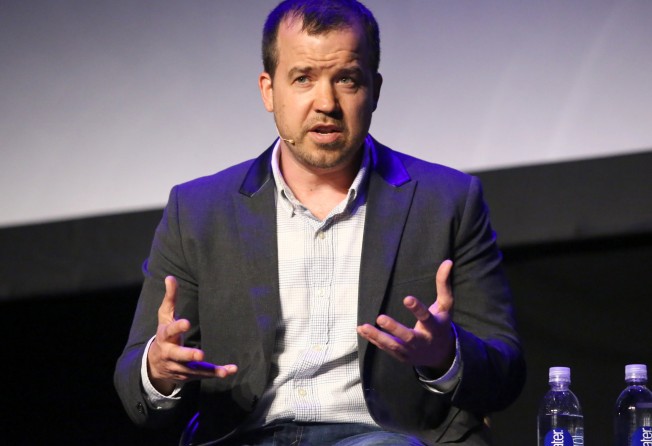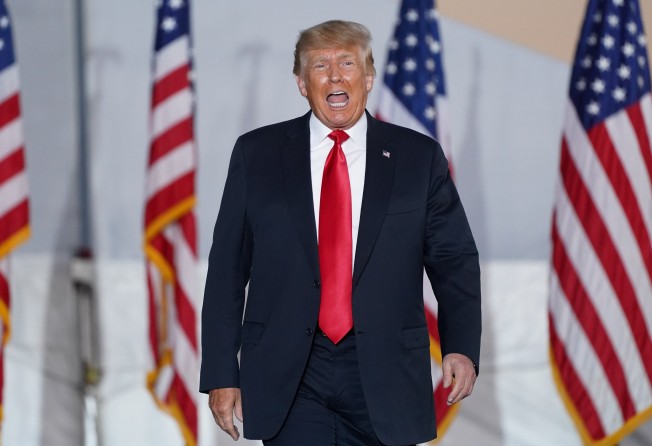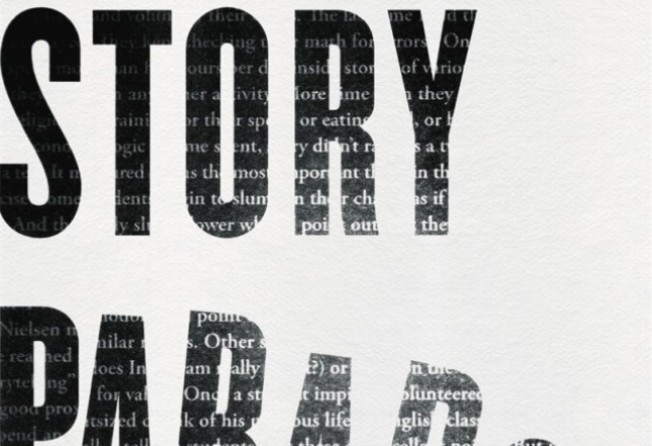
Author advocates empathy yet for Trump he can find none, somewhat denting his argument about the power of stories and how to avoid being manipulated by them
- American academic Jonathan Gottschall wrote a book about how stories ‘make us human’. Nine years on, he’s warning about their dangerous power to sway us
- We can fight that with empathy, he says, yet he has none for Donald Trump, treating him like dark Harry Potter wizard Voldemort. Who’s being manipulated now?

The Story Paradox: How Our Love of Storytelling Builds Societies and Tears them Down by Jonathan Gottschall pub. Basic Books
Once upon a time – which is to say, in 2012 – there was an American academic who wrote a book called The Storytelling Animal: How Stories Make Us Human. In it, he described how stories have evolved to help us survive and how they can change the world for the better.
Years passed. This month, another book by the same academic, Jonathan Gottschall, has appeared. It’s called The Story Paradox: How Our Love of Storytelling Builds Societies and Tears Them Down. It does not end happily ever after. What’s the story in between?
On a video call from Pennsylvania, where he’s a distinguished fellow in the English department at Washington & Jefferson College, Gottschall sighs. It won’t be for the last time; the overriding tone of this interview will be rueful. “Over the past decade, I’ve had this sense that, instead of doing this ancient work of making people believe in the same mythologies and values, and having this bonding function anthropologists have always attributed to stories, it felt like things were running amok and this weaving force in human life had become a cleaving force.”

“Cleaving” is one of those strange English words that can mean one thing and, simultaneously, its exact opposite. That’s the paradox: in Gottschall’s first book, stories stuck people together. In his new one, stories are splitting societies apart.
For the most part, he lays his argument out enjoyably. He’s a natural storyteller: it’s a page-turner that begins with a man literally walking into a bar. This is Gottschall, depressed about the state of the world and confused about what he’s trying to write. “Cheapest bourbon” in hand, he watches people interacting around him.
He comes to the conclusion that communication’s main purpose is to influence others and that “the primary function of storytelling is sway”.
“Sway” is one of those snappy, Gladwell-ian concepts that could make a good theme and a great title; but, oddly, Gottschall plays around with it, soon drops it and it’s never referred to again. What happened?
“At one point, I was writing a book called Sway,” he admits. “I’m weak enough to want to fit in with that trend […] On the other hand, if you have a Gladwell book there’s always a sort of self-improvement angle to it and he’s selling to business audiences. The book isn’t like that. I wanted to drive home that stories have a lot of power over us in ways we can’t usually detect.”
Whatever the Chinese build may not be as unpleasant as what seems to be in store for free societies
He knows this isn’t exactly a bolt-of-lightning insight (our conversation took place in a week when Facebook’s influence was making daily headlines) but Gottschall, whose “Works Cited” list runs for 30 pages at the end, has done a thorough job of truffling through history to present digestible morsels.
He writes about Plato’s desire to fling storytellers over the city walls; he mentions a theory that “the so-called human-rights revolution of the 1700s” was fuelled by the rise of the novel; he refers to popes, suicide bombers, Jane Austen, Noam Chomsky, George Floyd, Ernest Hemingway, QAnon, the Ku Klux Klan, Joffrey from Game of Thrones.
He also describes the Heider-Simmel experiment from 1944 – a minute-long animation that illustrates the human tendency to create narrative from the most basic shapes. You can find it on YouTube. This reviewer, studying the interactions of a triangle, circle and rectangle almost 80 years later, immediately thought of Squid Game. “Oh my God,” cries Gottschall. “I bet a lot of people see it that way now.”
And that’s the problem with what Gottschall calls our storyverse: our perceptions shift simultaneously, by the million, depending on what we last saw/heard/read. (After The New York Times ran “Bad Art Friend”, a recent story about a short story, squabbling factions lit up social media.)
Gottschall is warning readers about the pervasive effects of manipulation-by-story. He advocates empathy: conflicts spring from the randomness of birth into a particular tribe that just happens to tell a different story from you.

“I’m no better than a criminal,” his father once told the teenage Gottschall. “But I have enough money to pay for the bread so I get to be a good person.” On that basis, no one should be considered a villain.
Except, it seems, for the previous president of the United States. “His is the name that shall not be written by me,” writes Gottschall, grandly. For anyone familiar with Harry Potter, however, bracketing the (real life) Trump with the (fictional) Voldemort suggests Gottschall himself is caught within a story’s stranglehold.
Referring to the former president as “the Big Blare” and “the lustmonster” – making him inhuman, in other words – reinforces the tipping point. Gottschall knows it. Hence the ruefulness.
“Yeah, I worked myself into a bit of a corner there,” he says. “I wanted to say that villains don’t exist. Those people who stormed the Capitol [on January 6]? These are not bad people. These are good people, stuck inside a really twisted and warped story. But then I got to Trump … and I can’t see him in any other way.”
He tried, he says. He attempted to tone down the Big Blare’s portrait. “But when I showed it to people, it seemed so patronising, like I was trying to be more empathetic to this guy by saying he’s crazy. It didn’t read well.” Any tale has to appear to work – even when it contradicts itself.

In 2015, Gottschall wrote a book called The Professor in the Cage: Why Men Fight and Why We Like to Watch, about how he took up mixed martial arts when he felt his academic career was “dead in the water”. Ah, simpler times. Now he’s grappling with tougher opponents and no one’s on the sidelines watching any more; we’re all involved.
For any right-wingers reading this and frothing, be assured, he’s an equal-opportunities pessimist. “What has troubled my sleep is the prospect of saying anything even mildly heretical regarding the Left’s sacred narratives,” he writes.
Unusually China, with its Platonic-pleasing story firewall, gets a – sort of – pass: “Whatever the Chinese build may not be as unpleasant as what seems to be in store for free societies […] locked-in wars of stories escalating toward something worse …”
He offers no winning strategy. “I say this in a self-mocking way,” he says, smiling (and sighing). “The goal of the book is to the save the world. Maybe people who are smarter than me can find ways to solve the problems. But I have some faith that the first step towards solving it is understanding it. Stories are powerful and dangerous – and they’re driving us mad.”